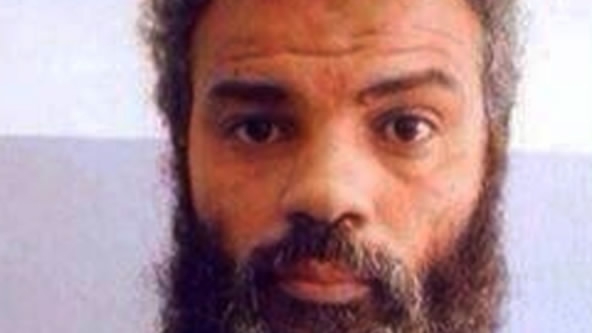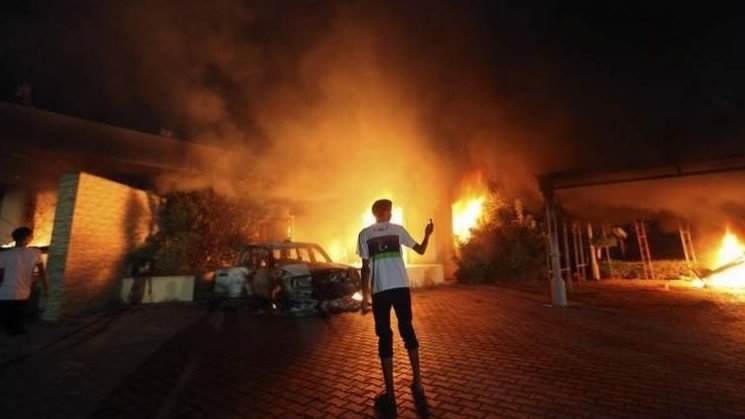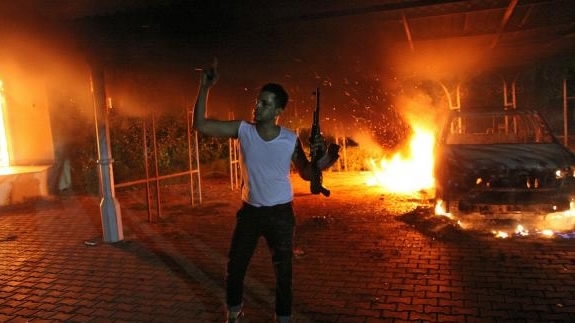
Politics
11:41, 29-Nov-2017
Benghazi ringleader acquitted of most serious charges
CGTN

A US jury on Tuesday acquitted accused Islamic militant Ahmed Abu Khatallah of the most serious charges he faced in connection with a 2012 attack on a US diplomatic compound in Benghazi, Libya, that killed US Ambassador Christopher Stevens and three other Americans.
The jury in US District Court for the District of Columbia found Khatallah guilty on only four of the 18 counts he faced and acquitted him on murder and other charges, according to the Justice Department.
He was convicted on one count of conspiracy to provide material support to terrorists, one count of providing material support to terrorists, one count of maliciously destroying property and one count of using and carrying a semiautomatic weapon during a violent crime, according to a spokesman for the US Attorney’s Office for the District of Columbia.
The jury reached its verdict after five days of deliberations.
Khatallah is the first person to be tried in connection with the 2012 attack in Benghazi. A second person alleged to be involved, Mustafa al-Imam, made his first court appearance earlier this month.

The US Consulate in Benghazi is seen in flames during a protest by an armed group said to have been protesting a film being produced in the United States, September 11, 2012. /Reuters Photo
The US Consulate in Benghazi is seen in flames during a protest by an armed group said to have been protesting a film being produced in the United States, September 11, 2012. /Reuters Photo
The case marks a major test of the government’s ability to capture and try alleged terrorists in civilian courts rather than military proceedings.
In a message to Central Intelligence Agency staff on Tuesday, Director Mike Pompeo said a “small measure of justice was meted out” by the verdict.
In this case, prosecutors acknowledged that Khatallah did not directly participate in the attack on the US consulate or nearby CIA annex.
Rather, they sought to convince the jury that he helped orchestrate it behind the scenes.
Khatallah was captured in 2014 by US military and FBI officials in Libya and transported to the United States aboard a Navy vessel.

An armed man waves his rifle as buildings and cars are engulfed in flames after being set on fire inside the US consulate compound in Benghazi on September 11, 2012. /AFP Photo
An armed man waves his rifle as buildings and cars are engulfed in flames after being set on fire inside the US consulate compound in Benghazi on September 11, 2012. /AFP Photo
He was first questioned by US intelligence officials and later by the FBI. Khatallah waived his right to speak first with an attorney, and prosecutors used his statements in the trial.
They also presented evidence including phone records showing that the defendant made calls to his associates right before they were captured on grainy videos participating in the attack and testimony from a variety of witnesses.
Defense attorneys for Khatallah said the witnesses lacked credibility, especially one witness who was paid 7 million US dollars to inform on their client and lure to him the place where he was captured.
Khatallah faces a statutory minimum sentence of 15 years in prison for each of the two terrorism charges, 20 years for the property destruction charge and 10 years for the firearms offense.
Source(s): Reuters

SITEMAP
Copyright © 2018 CGTN. Beijing ICP prepared NO.16065310-3
Copyright © 2018 CGTN. Beijing ICP prepared NO.16065310-3